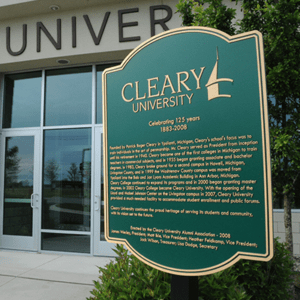Social Media Guidelines
Social network sites such as Facebook, Twitter, and YouTube are exciting channels to share knowledge and accomplishments, express creativity, and connect with others. Cleary University supports participation in these on-line communities to further our branding messages. This policy addresses best practice guidelines to help employees and students use these forums effectively, protect personal and professional reputation, and to adhere to University policies.
When posting as an individual, faculty, staff, students, and alumni of Cleary University should:
- Protect confidential and proprietary information by not posting this type of information related to Cleary University, students, employees, or alumni. Students and employees are required to adhere to all applicable University privacy and confidentiality policies.
- Refrain from posting anything disparaging related to the University, any faculty or staff member, student, or other member of the school community (current or former). Particular concerns can be shared with the Senior Vice President, Institutional Advancement.
- Refrain from using the Cleary University logo or any other University images or iconography on personal social media sites. The use of Cleary University’s name to promote a product, cause, or political party or candidate is prohibited.
- Maintain transparency. The line between professional and personal business is sometimes blurred. Be thoughtful about the content of postings and potential audiences. Honesty is important with regard to identity. Posts should be clear that they are from an individual and not a representative of the University.
- Exercise appropriate discretion when using social networks for personal communications (friends, colleagues, parents, former students, current students, etc.) and wall posts with the knowledge that what you publish on-line will be public for a long time.
- Refrain from reporting, speculating, discussing, or giving any opinions on University topics or personalities that could be considered sensitive, confidential, or disparaging.
When posting on behalf of Cleary University, faculty staff, and students of Cleary University should:
- Be accurate. Ensure that all facts are collected prior to a post. Verify information with a reputable source. Cite and link your sources whenever possible; it is a great way to build community.
- Seek permission. Written permission from the Office of Institutional Advancement is required prior to creating a social media account or Web site on behalf of the University. Only the use of the official version of the Cleary University logo is permitted.
- Be timely. Assign an administrator who can regularly monitor postings and content.
- Monitor comments. While comments are welcomed and they are helpful in building credibility and community, it is advised that the site is set up to review and approve comments before they appear on the site. This allows timely response to comments as well as the ability to delete spam comments and to block any individuals who repeatedly post offensive or frivolous comments.
- Verify appropriateness. This can be accomplished by applying the publicity test. That is, is the content of the message acceptable for a face-to-face conversation, a telephone conversation, or another medium, or would it be appropriate for the message to be published in a newspaper or on a billboard (tomorrow or ten years from now)? If not, then the message would not be acceptable for a social networking site.
Students found to be in violation of these guidelines may be subject to disciplinary action, including, suspension or expulsion.
Student Email Policy
All students will be assigned a University email address and will be expected to read their email daily so they are kept informed of current University events, dates for submitting materials, etc. It is the student’s responsibility to be aware of and to read all University correspondence sent to the student’s University email address by Cleary University faculty and administration.
All student email accounts will be managed in the following manner:
- The format of the Cleary University student email addresses will be the student’s first initial and up to the first ten characters of his/her last name and the last three digits of his/her student identification number. All student email addresses will be created in the my.cleary.edu domain. Non-alphabetic characters will be removed from the name of the student when the account is created.
- Automated forwarding of email to external email addresses is allowed; however, the University does not guarantee delivery to personal email addresses.
- In the event the student fails to register for classes or otherwise ceases to be a registered student of the University, the email account will be kept active for a period of six months following the end of his/her last class.
- Upon graduation, student email accounts will convert to alumni accounts. Alumni accounts can be removed at the request of the student/alumni.
The University will not release the email addresses of any students for marketing purposes. Any use of the email system for non-academic purposes by faculty, staff, or students is prohibited. Use of the student email is subject to all other Cleary University policies, including the Technology Acceptable Use policy and all applicable laws regarding copyrights and file sharing.
Technology Acceptable Use Policy
Cleary University provides computers and networks to further its academic mission. The computers and networks of the University are a shared resource designed to meet the needs of students, faculty, and staff. All users of these resources must consider their role and usage of these systems in the context of all other users. Faculty, staff, and students are prohibited from encouraging or requiring others to violate this policy.
This policy governs student, faculty, staff, and all other use of Cleary University computers, networks Web sites, classroom audio-visual media, and related equipment. Use of University technology facilities constitutes agreement to comply with this policy. Violation of this policy may result in removal of user privileges, reimbursement to the University for damaged property, dismissal, and/or termination. The Information Technology Department (ITD) of Cleary University maintains this policy and monitors compliance in conjunction with the Deans, Academic Services Department, and the Human Resources Department. The provisions of the Technology Acceptable Use Policy follow:
- Users may not use the University’s computers, software, network, or Web site for purposes other than those intended by the University in pursuit of its educational mission. Reasonable personal use of these facilities is permitted. They may not be used to pursue the activities of any business or organization other than Cleary University.
- All Users must respect the privacy and usage privileges of others, both on the Cleary University campus and at all sites reachable by Cleary University’s external network connections.
- Users shall not intentionally seek information on, obtain copies of, or modify files, other data, or passwords belonging to other Users, whether on the Cleary University campus or elsewhere, or develop or retain programs for that purpose, without the authorization of the file owner or Chief Information Officer. Reasonable file copying (e.g., in back‐ups) and password changes are permitted among the routine tasks of System Managers and of appropriately authorized Facility Staff.
- Users shall not represent themselves electronically as others, either on the Cleary University campus or elsewhere, unless explicitly authorized to do so by those other Users. To be valid, such authorization of one User by another User must not circumvent established, system‐specific policies defining eligibility for resource access.
- Users shall not intentionally develop or retain programs that harass other Users, either on the Cleary University campus or elsewhere.
- Users shall not obstruct or disrupt the use of any computing system or network by another person or entity, whose usage is protected by law, ordinance, regulations, or administrative ruling either on the University campus or elsewhere.
- All Users must respect the integrity of computing systems and networks, both on the Cleary University campus and at all sites reachable by Cleary University’s external network connections.
- Users shall not by any means attempt to infiltrate (e.g., gain access without proper authorization) a computing system or network, either on the Cleary University campus or elsewhere.
- Users shall not attempt to damage or alter without proper authorization from the System Sponsor, either the hardware or the software components of a computing system or network, either on the Cleary University campus or elsewhere.
- All users of Cleary University computers and networks also agree to comply with the terms of the Merit Network, Inc., acceptable use policy http://www.merit.edu/policies/acceptable_use.php
- Users are prohibited from the malicious use of technology to disrupt the use of technology by others, to harass or discriminate against others, and to infiltrate unauthorized computer systems. Illegal activities are strictly forbidden.
- Users of the Internet on University‐owned equipment are not permitted to locate, view, print, or download pornographic material, inappropriate files, or files dangerous to the integrity of the University’s network, equipment, or software.
- Users must adhere to copyright laws as may be applicable in the use of hardware and software and in the transmission of copyrighted text or files on the Internet or from other resources.
- All software installed on University computers must have an appropriate license owned by Cleary University and provided to the ITD. Microsoft Office Suite is the software standard supported and provided by the University. The ITD must be notified before installing any other software on a University‐owned computer. Student copies of software purchased for a class may only be installed in the student computing lab under the direction of the instructor.
- Users may not change, add to, or in any way alter the operating system or software configuration on a University‐owned computer.
- Passwords are the property of the User and are not to be used by anyone else.
- Users must use and are not allowed to circumvent University virus‐scanning software.
- Cleary email Users may be asked by the ITD to discontinue using the cleary.edu address for subscriptions to a discussion forum or news group that causes large volumes of e‐mail traffic on University servers.
- All Users of Cleary University property are expected to take reasonable care to protect it from loss or damage. Intentional damage, misuse, or careless disregard for the safeguarding of University property is prohibited.
- All students, faculty, and staff agree to comply with the acceptable use policies of Cleary University’s vendors, partners, and affiliates.
- All persons are expected to abide by the generally accepted rules of e‐mail etiquette.
These include, but are not limited to, the following:- Be polite. Do not be abusive in your messages to others.
- Use appropriate language. Do not swear, use vulgarities, or use any other inappropriate language.
- Do not reveal your personal address or phone number, or those of students or colleagues.
- Do not send unsolicited e‐mail that would be considered unwanted by a recipient.
- All e‐mail is considered private, but e‐mail messages may be used as evidence in the event of litigation arising out of possible illegal activities.
Telephone Usage
The use of telephones is necessarily restricted to business purposes. Personal use and incoming calls should be limited to emergencies and urgent matters. Personal long-distance calls charged to the University are not permitted. Additionally, the use of cell phones during class is prohibited.



